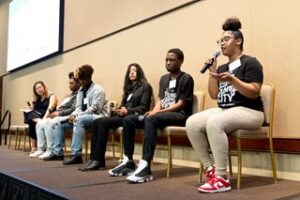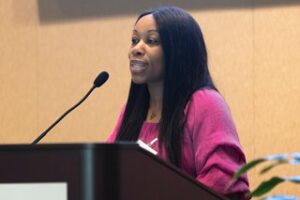Nationally, the majority of public-school students are students of color, however, only 21% of the teacher workforce are teachers of color and only 7% of teachers are Black. Shareefah Mason with Jacqueline Adam-Taylor and Tonya Clark presented these numbers at a recent event with Effective Teaching, an initiative of Educate Texas.
This event saw a screening of Mason’s documentary film, “From the Block” as well as a community and student panel. With research explaining that teacher diversity is critical for student success, Mason brought together members of the South Oak Cliff community to discuss the personal importance and impact that Black teachers have here at home and offered solutions to the problem based on recent studies.
“By sharing our experiences, both personally and professionally, we would be able to have a conversation around the power and impact of Black teachers,” said Mason at the event held in partnership with Young Leaders, Strong City. 
Pictured: Young Leaders, Strong City student panel
Founded in 2014, Young Leaders, Strong City’s (YLSC) mission is to educate, equip and activate a community of youth leaders prepared to realize their visions for racial justice and equity. YLSC brought in student representatives from Lincoln High School to discuss the impact that Black teachers have had in their lives. Shareefah Mason’s goal is to bring together the community of the South Oak Cliff area and have people understand that “Oak Cliff is in every section of this country because ‘Oak Cliff’ is a state of mind and being that can be found in any impoverished area. That is why we need Black teachers, because Black teachers will go into any ‘Oak Cliff’ and will get the job done.”

Pictured: Shareefah Mason, Executive Producer of “On the Block”
Why is there a lack of teacher diversity?
The lack of teacher diversity today is due to systemic factors that hinder the recruitment and retention of Black teachers.
The Brown vs. Board of Education Supreme Court ruling in 1954 failed to ensure equitable desegregation, leading to a significant loss of Black educators.
“From the Block” opens with a powerful statistic explaining that “Today, only about 7% of K-12 educators are Black. In 2003-2004, about 47,600 educators of color entered the profession. At the end of the year, 56,000 educators of color had left the profession.”
Systemic issues persist, with students of color being less likely to enter teacher preparation programs due to higher student loan debt, lower college completion rates, and antagonistic college environments.
How has the lack of teacher diversity affected the classroom?
Throughout the film screening of “From the Block” and the panel discussions, there was a theme of trauma and how it affects teaching and learning. The systemic systems that have been set in place have left a mark on the education system, creating a traumatic learning environment.
In the film, Shareefah Mason reveals her experience as an educator and the trauma that educators deal with daily, describing how she has had to bury over 20 students in the same zip code. She explained “We also have to deal with the fact that some of these students will not be with us at the end of the year because the community itself is set up to fail these students.”
Keauna Mccullum, a student from Lincoln High School on the student panel, described her experience as a teenager dealing with mental health issues. She explained how she feels about the access to mental health services at school saying, “Personally, I feel like there’s nothing.”
The other students on the panel agreed with her sentiment, finding immediate trust in the teachers and adults they can look up to. She continues by explaining, “They [teachers] are the best that they can be. Even though they don’t get paid enough to be a therapist, they’re pretty good.”
A community panel member, Dr. Salena Smith, Founder and Trauma-Informed Practitioner of Inner Ear Agency, explained what it is like teaching students that are dealing with hardships, describing how these students were labeled as “bad.” She explained that it took years into her career to learn and understand the personal struggles that these students are dealing with. “Children will only learn if they can operate in their thinking brain, and they can’t operate in their thinking brain unless they have a trusted adult that supports them.”
How does teacher diversity impact students?
With a system that has failed to create an equitable teaching and learning environment, students find familiarity in looking up to someone that looks like them. The students and educators featured in the film and on the panels explained what it was like to have a teacher that they could look up to as a child.
Both students and educators acknowledged that having a teacher or an adult that you can look up to creates a sense of comfort and relatability. Amorye Mcknight, a student from Lincoln High School, expressed, “I can go to them with problems, and I know that they are most likely to understand what I’m going through. They could have been in that certain situation that I was in.”
Steven Jackson, a member of the community panel and the Director of Recruitment for Dallas ISD, described the importance of Black teachers when he was a student in school. He said, “I have a very different experience than a lot of people. From my kindergarten through fourth grade, I had four Black male teachers, which is unheard of anywhere you’ll go.”
Research shows that teacher diversity is crucial for student outcomes, particularly for students of color; however, Shareefah Mason, co-author of To Be Who We Are: Black Teachers on Creating Culturally Affirming Schools, explains in the national report, that exposure to diverse teachers improves the academic performance of white students as well.
The Solution
To Be Who We Are: Black Teachers on Creating Culturally Affirming Schools outlines five different conditions that Black teachers identified as crucial to creating school cultures that support their identities and allow them to be their authentic selves:
They also offered specific recommendations to school leaders, district leaders, and state policy makers to support more affirming school cultures for Black Teachers.
Creating a diversified pipeline of teachers is an essential part of closing educational gaps for students across Texas. Educate Texas remains dedicated to supporting efforts to improve the quality of teaching and create equitable learning environments for all students.
This article was authored by Educate Texas Intern, Savannah Fluitt